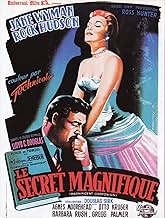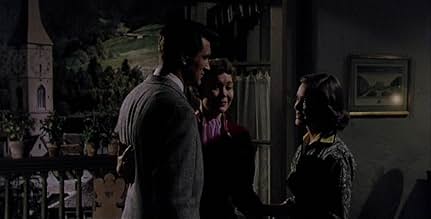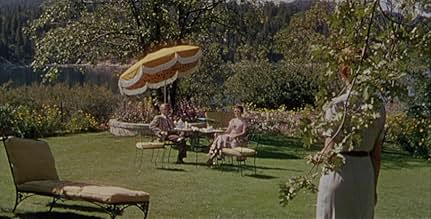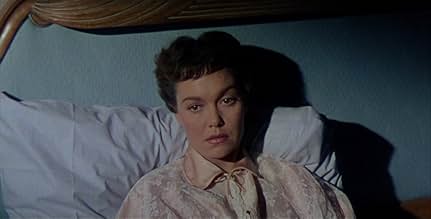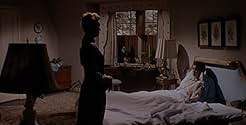IMDb-BEWERTUNG
7,0/10
8077
IHRE BEWERTUNG
Ein egoistischer Playboy, der in einer Frau verliebt ist, die er mehr zu verletzen scheint, als er beabsichtigt, beginnt, eine tiefere Bedeutung in ihrer Beziehung zu sehen.Ein egoistischer Playboy, der in einer Frau verliebt ist, die er mehr zu verletzen scheint, als er beabsichtigt, beginnt, eine tiefere Bedeutung in ihrer Beziehung zu sehen.Ein egoistischer Playboy, der in einer Frau verliebt ist, die er mehr zu verletzen scheint, als er beabsichtigt, beginnt, eine tiefere Bedeutung in ihrer Beziehung zu sehen.
- Für 1 Oscar nominiert
- 2 Gewinne & 1 Nominierung insgesamt
Joseph Mell
- Dan
- (as Joe Mell)
Empfohlene Bewertungen
My unashamed love for the films of Douglas Sirk may be described as an obsession, but it is to me, of course, a magnificent obsession. My attempts to influence others as to Sirk's genius have mostly failed. He's a director whose work you either get, or not. Those who view his works as camp masterpieces are very much missing the point. What is intrinsic in works of camp is the end product being appreciated in a manner that the creator had not intended. However, every camera angle of each frame, every nuance, indeed every color in every shot is totally intentional in all of Sirk's major films.
"Magnificent Obsession" is far from Sirk's best work, but it is perhaps his most important. Though he had made films in many genres, it was "All I Desire", his 1952 melodrama that paved the way for what would become his special place in cinema history. In the often ridiculed genre of so called "woman's movies", Sirk discovered there was great scope for artistic expression as well as social criticism and much more in this apparently vacuous genre. "Magnificent Obsession" is the first film in which this vision is realised.
To understand why this happened at all one must remember that Sirk was under a long term contract with Universal throughout the fifties, when they were by all accounts an inferior studio. As an European immigrant in need of work, Sirk signed to Universal, with the full understanding of the type of projects that would be offered to him. His intellectual and rich theatrical background would be put to use in clearly inferior material. When asked about this, he gave the example of how many of Shakespeare's plots are weak and uninteresting in themselves; it's the language that makes them art. Sirk was a master of cinematic language in all its aspects. The plots of his movies are often truly abysmal, but the language always pure joy to behold. "Magnificent Obsession" is a prime example of the abyss between screenplay and the cinematic language employed.
After reading the script of "Magnificent Obsession", Sirk called the plot "crazy" and did not want to make it. But as a contracted director, he had little sway with the studio heads and was persuaded, as always, to make the movie. It should be noted that he never had a bad word to say about Universal, even after he left Hollywood. He fully understood the contract he had made and simply made the best of his situation. It should also be noted that he gave Universal some of their greatest commercial successes of the decade, and created for them a star leading man, something they were in desperate need of. That star was Rock Hudson. "Magnificent Obsession" was Hudson's breakthrough film. He made eight films together with Sirk.
The magnificent obsession in question is the quest for spirituality; not exactly high on the agenda of materialistic, picture perfect, upper class American society of the fifties. Bob Merrick (Rock Hudson) is a shallow, womanizing, heavy drinking, spoiled playboy. The movie charts his journey towards spirituality. He is guided on this path by an older intellectual artist, Edward Randolph (Otto Kruger). Many critics have noted the physical similarities between Kruger and Sirk himself. It's almost irresistible to develop this notion. It is Randolph who despite Merrick's crass behavior perceives a potential for greater things and leads him towards self fulfillment.
Similarly it was Sirk who first spotted Rock Hudson's star potential. Under his guidance and direction, Hudson would in a matter of two to three years, become one the most popular actors in Hollywood. Having worked closely on eight films, it would seem absurd that Sirk was not aware of Hudson's homosexuality. This did not deter Sirk, (who himself was not gay). Moreover it fits well with his fascination for what he termed "split characters". It's the embodiment of fifties picture perfect appearance shielding a very different reality that is central to much of Sirk's work.
Edward Randolph quietly removes himself when he realises his protégé has finally found his new self. His work is done. While Hudson was no heavyweight in the acting stakes, under Sirk's direction he gave some very respectable performances, "Magnificent Obsession" amongst his best. His post Sirk career would soon take him to Doris Day territory, a far cry from the likes of "Written on the Wind", "Tarnished Angels" and "Battle Hymn".
All of Sirk's films are worth taking a close look at, particularly from "Magnificent Obsession" onwards. There are a handful of directors who so well grasped the possibilities of film making and possessed the know how in using the many elements that make up this art form.
"Magnificent Obsession" is far from Sirk's best work, but it is perhaps his most important. Though he had made films in many genres, it was "All I Desire", his 1952 melodrama that paved the way for what would become his special place in cinema history. In the often ridiculed genre of so called "woman's movies", Sirk discovered there was great scope for artistic expression as well as social criticism and much more in this apparently vacuous genre. "Magnificent Obsession" is the first film in which this vision is realised.
To understand why this happened at all one must remember that Sirk was under a long term contract with Universal throughout the fifties, when they were by all accounts an inferior studio. As an European immigrant in need of work, Sirk signed to Universal, with the full understanding of the type of projects that would be offered to him. His intellectual and rich theatrical background would be put to use in clearly inferior material. When asked about this, he gave the example of how many of Shakespeare's plots are weak and uninteresting in themselves; it's the language that makes them art. Sirk was a master of cinematic language in all its aspects. The plots of his movies are often truly abysmal, but the language always pure joy to behold. "Magnificent Obsession" is a prime example of the abyss between screenplay and the cinematic language employed.
After reading the script of "Magnificent Obsession", Sirk called the plot "crazy" and did not want to make it. But as a contracted director, he had little sway with the studio heads and was persuaded, as always, to make the movie. It should be noted that he never had a bad word to say about Universal, even after he left Hollywood. He fully understood the contract he had made and simply made the best of his situation. It should also be noted that he gave Universal some of their greatest commercial successes of the decade, and created for them a star leading man, something they were in desperate need of. That star was Rock Hudson. "Magnificent Obsession" was Hudson's breakthrough film. He made eight films together with Sirk.
The magnificent obsession in question is the quest for spirituality; not exactly high on the agenda of materialistic, picture perfect, upper class American society of the fifties. Bob Merrick (Rock Hudson) is a shallow, womanizing, heavy drinking, spoiled playboy. The movie charts his journey towards spirituality. He is guided on this path by an older intellectual artist, Edward Randolph (Otto Kruger). Many critics have noted the physical similarities between Kruger and Sirk himself. It's almost irresistible to develop this notion. It is Randolph who despite Merrick's crass behavior perceives a potential for greater things and leads him towards self fulfillment.
Similarly it was Sirk who first spotted Rock Hudson's star potential. Under his guidance and direction, Hudson would in a matter of two to three years, become one the most popular actors in Hollywood. Having worked closely on eight films, it would seem absurd that Sirk was not aware of Hudson's homosexuality. This did not deter Sirk, (who himself was not gay). Moreover it fits well with his fascination for what he termed "split characters". It's the embodiment of fifties picture perfect appearance shielding a very different reality that is central to much of Sirk's work.
Edward Randolph quietly removes himself when he realises his protégé has finally found his new self. His work is done. While Hudson was no heavyweight in the acting stakes, under Sirk's direction he gave some very respectable performances, "Magnificent Obsession" amongst his best. His post Sirk career would soon take him to Doris Day territory, a far cry from the likes of "Written on the Wind", "Tarnished Angels" and "Battle Hymn".
All of Sirk's films are worth taking a close look at, particularly from "Magnificent Obsession" onwards. There are a handful of directors who so well grasped the possibilities of film making and possessed the know how in using the many elements that make up this art form.
I am a Douglas Sirk devotee and regard him as one of the screen's more underrated directors. Having said that, I regard "Magnificent Obsession" as a bit much, even for Sirk. I like Sirk because, even though he is a master of soapers, he is more than that. His films contain social commentaries that are often biting, and they often contain good character studies. In this preachy film the social commentary is absent and the characters are one dimensional. But I can forgive all this because the acting is good--Wyman, Kruger, and Moorhead are excellent--and Sirk showed that Rock Hudson could act if properly directed. This was Hudson's breakthrough film. But the music is almost too much to bear! I have never heard such wretchedly maudlin, and loud, movie music in my life. The heavenly choruses in the background are shameless. In spite of all this, however, it is all quite entertaining. 7/10
Bob Merrick (Rock Hudson) gets his commuppance and learns to be not such a reckless rich twat, with the help of a fairy godfather and falling in love with a woman he made go blind!
If you've never heard of Douglas Sirk, be prepared that this will be melodrama city. Production values are superb, though. Sirk was a very talented craftsman, as well as creating a beautiful aesthetic for these films.
Sirk made the hospital and the classic American home look as artificial and sanitised as he could: with lipstick so bright and full the lips jump off the faces, sculpted hair and good looks, everything in its right place and colours so stark it looks like a children's colour book. These locales are contrasted with a couple of other places, darkly beautiful: the scene where Rock is sitting at a bar, which starts with the rather loose and drunk looking woman leaning up against the wall, with curls of cigarette smoke and beautiful light in the background. The other is the night scene in Paris, with such exquisite light coming through the doors of the apartment.
Rock is actually pretty good in the film, and really perfect looking. I can see why Sirk picked him out - he's a Ken doll - playing the fantasy American: rich, beautiful and devil-may-care. And after this flick, he was also a star.
3/5. I liked La Habanera better, though.
If you've never heard of Douglas Sirk, be prepared that this will be melodrama city. Production values are superb, though. Sirk was a very talented craftsman, as well as creating a beautiful aesthetic for these films.
Sirk made the hospital and the classic American home look as artificial and sanitised as he could: with lipstick so bright and full the lips jump off the faces, sculpted hair and good looks, everything in its right place and colours so stark it looks like a children's colour book. These locales are contrasted with a couple of other places, darkly beautiful: the scene where Rock is sitting at a bar, which starts with the rather loose and drunk looking woman leaning up against the wall, with curls of cigarette smoke and beautiful light in the background. The other is the night scene in Paris, with such exquisite light coming through the doors of the apartment.
Rock is actually pretty good in the film, and really perfect looking. I can see why Sirk picked him out - he's a Ken doll - playing the fantasy American: rich, beautiful and devil-may-care. And after this flick, he was also a star.
3/5. I liked La Habanera better, though.
This is a nice remake of the classic 1935 film of the same title that starred Irene Dunne and Robert Taylor, this 1954 adaptation is fathful to former original . This time is starred by Jane Wyman and Rock Hudson, both of whom give fine acting . It deals with a drunken playboy : Rock Hudson inadvertently causes death Jane Wyman's husband, but then Wyman to be knocked down in an automobile accident and eventually blinded. The the alcoholic playboy plagued by guilt leaves his previous roguish life and devots his existence to studying medicine in order to restore the widow's sight . Stricken with remorse , he gets redemption by becoming a surgeon and attempting to cure her . The story of a woman's need for a man that will become one of the great emotional tour lifetime ¡ .The great love story by the author of "The Robe" by Lloyd C. Douglas . Here is a love story that will become one of the deepest emotional thrills of your lifetime !.
A melodramatic movie with emotion , romance , fatalism, sacrifice and tragedy . Starring duo are pretty well, Rock Hudson as the playboy who for a deep feeeling of guilt he becomes a brain surgery, though he looks a touch bewildered but toughs it out , this role lifted Rock to stardom. However , this character was firstly offered to Jeff Chandler , but he turned down, the reason for considering the film was too much soapy . While Jane Wyman as the mature widow takes it in her stride, she had Academy Award Nomination but lost to Audrey Hepburn for "Roman Holiday" directed by William Wyler . Other secondaries are frankly well , such as : Barbara Rush , Paul Cavanagh , Otto Kruger , Gregg Palmer, Richard Cutting, Mae Clarke and Agnes Moorehead.
It contains luxurious and colorful cinematography by Russell Metty . As well as sensitive and romantic musical by Frank Skinner .The motion picture lavishly produced Universal Pictures/Ross Hunter was compellingly directed by Douglas Sirk. He was an expert on melodrama, though also made other genres , such as : " A scandal in París" "Lured", "First Legion", "All I desire", "All the Heaven allows", "Written on the Wind", "Tarnished Angels", "Battle Hymn" , "Thunderbolt and Lightfoot" , "Athila King of Huns" , "A Time to Love and a Time to Die" , "Imitation of Life" , among others. The yarn will appeal to Rock Hudson and Jane Wyman fans . Rating : 7/10. Better than average . Well worth seeing .
A melodramatic movie with emotion , romance , fatalism, sacrifice and tragedy . Starring duo are pretty well, Rock Hudson as the playboy who for a deep feeeling of guilt he becomes a brain surgery, though he looks a touch bewildered but toughs it out , this role lifted Rock to stardom. However , this character was firstly offered to Jeff Chandler , but he turned down, the reason for considering the film was too much soapy . While Jane Wyman as the mature widow takes it in her stride, she had Academy Award Nomination but lost to Audrey Hepburn for "Roman Holiday" directed by William Wyler . Other secondaries are frankly well , such as : Barbara Rush , Paul Cavanagh , Otto Kruger , Gregg Palmer, Richard Cutting, Mae Clarke and Agnes Moorehead.
It contains luxurious and colorful cinematography by Russell Metty . As well as sensitive and romantic musical by Frank Skinner .The motion picture lavishly produced Universal Pictures/Ross Hunter was compellingly directed by Douglas Sirk. He was an expert on melodrama, though also made other genres , such as : " A scandal in París" "Lured", "First Legion", "All I desire", "All the Heaven allows", "Written on the Wind", "Tarnished Angels", "Battle Hymn" , "Thunderbolt and Lightfoot" , "Athila King of Huns" , "A Time to Love and a Time to Die" , "Imitation of Life" , among others. The yarn will appeal to Rock Hudson and Jane Wyman fans . Rating : 7/10. Better than average . Well worth seeing .
Having seen both versions of Magnificent Obsession, I have to say I prefer the remake. It's glossier and more melodramatic, which is the point of such a soapy story. However, neither movie grabs me or makes me reach for the Kleenex box. In 1936, I couldn't stand Robert Taylor, and in 1954, I didn't like Jane Wyman very much. Mild dislike wins out over an intense one, so if you're going to rent one of the versions, I'd recommend this one.
Rock Hudson is a careless playboy, and when he endangers himself in a senseless accident, he uses up valuable emergency medical equipment that could have gone to someone else-literally. Because the equipment was used to save Rock's life, a beloved doctor in a nearby hospital died. Rock feels very guilty and tries to make it up to the man's widow, Jane Wyman, but she understandably hates him and can't forgive him. Then, in another cruel twist of fate, Rock accidentally hits Jane with his car and blinds her! The movie is titled Magnificent Obsession because he makes it his mission to make up for all the wrong he's done to her, so if that story appeals to you, you'll probably like it.
It really is an interesting, melodramatic story that could have stood another remake. If you like the chemistry of the two leads, you can check out the other romance they made together, All That Heaven Allows. I would have preferred another choice for this movie's lead, someone more tragic like Jennifer Jones or Susan Hayward. Then again, Jane Wyman did play tragic figures in Johnny Belinda and The Glass Menagerie, so if you like her style, you might really like her in this.
Rock Hudson is a careless playboy, and when he endangers himself in a senseless accident, he uses up valuable emergency medical equipment that could have gone to someone else-literally. Because the equipment was used to save Rock's life, a beloved doctor in a nearby hospital died. Rock feels very guilty and tries to make it up to the man's widow, Jane Wyman, but she understandably hates him and can't forgive him. Then, in another cruel twist of fate, Rock accidentally hits Jane with his car and blinds her! The movie is titled Magnificent Obsession because he makes it his mission to make up for all the wrong he's done to her, so if that story appeals to you, you'll probably like it.
It really is an interesting, melodramatic story that could have stood another remake. If you like the chemistry of the two leads, you can check out the other romance they made together, All That Heaven Allows. I would have preferred another choice for this movie's lead, someone more tragic like Jennifer Jones or Susan Hayward. Then again, Jane Wyman did play tragic figures in Johnny Belinda and The Glass Menagerie, so if you like her style, you might really like her in this.
Wusstest du schon
- WissenswertesThis film was an early starring role for Rock Hudson, and, according to Jane Wyman, he was very nervous. Some of his scenes had to be reshot thirty or forty times, but Wyman never said a word. Reportedly, years later at a party, Hudson ran into Wyman and said, "You were nice to me when you didn't have to be, and I want you to know that I thank you and love you for it."
- PatzerAt the accident scene, as the taxicab door closes, it is seen that there is no damage to it.
- Zitate
[last lines]
Edward Randolph: Once you find the way, you'll be bound. It will obsess you. but believe me, it will be a magnificent obsession.
- VerbindungenFeatured in Behind the Mirror: A Profile of Douglas Sirk (1979)
- SoundtracksConsolations, S. 172 No. 3 in D flat major - Lento, placido
Written by Franz Liszt
Top-Auswahl
Melde dich zum Bewerten an und greife auf die Watchlist für personalisierte Empfehlungen zu.
- How long is Magnificent Obsession?Powered by Alexa
Details
- Erscheinungsdatum
- Herkunftsland
- Sprachen
- Auch bekannt als
- Magnificent Obsession
- Drehorte
- Produktionsfirma
- Weitere beteiligte Unternehmen bei IMDbPro anzeigen
- Laufzeit1 Stunde 48 Minuten
- Farbe
- Seitenverhältnis
- 2.00 : 1
Zu dieser Seite beitragen
Bearbeitung vorschlagen oder fehlenden Inhalt hinzufügen

Oberste Lücke
By what name was Die wunderbare Macht (1954) officially released in India in English?
Antwort


